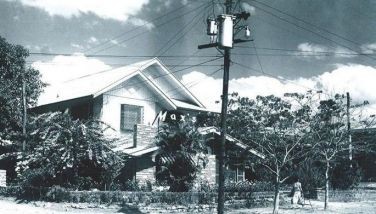Change for the better

September 3, 2004 | 12:00am
Changes are usually bound to encounter stiff resistance. Unfailingly, there are advocates of the status quo every time something new comes up because they would not want to "rock the boat" where life seems to be kinder and less difficult or more beneficial to them. Prevalent among human weaknesses is the tendency to follow the line of least resistance or the fear of trying untested waters. These are truisms presently happening in connection with the opposition to the latest proposal to use the national language as the medium of communication in court proceedings.
Some lawyers both in the bench and the bar, and court employees, particularly court stenographers have expressed disapproval of this move with seemingly sound and convincing arguments when viewed at close range.
Expectedly, a number of law practitioners object mainly because none of our laws has been originally drawn up and passed in Filipino. All the existing laws in our country have been enacted either in English or Spanish, later translated into English, in legislative proceedings conducted either in English or Spanish. Certain legal terms have root words derived from ancient Latin language of the Romans that have no exact counterpart in our national language. Hence lawyers from the bench and the bar, and law students from the academe have learned, interpreted and applied the law using the English language as the medium. So according to these lawyers, conducting the judicial or quasi judicial proceedings in Filipino may thus merely result in greater confusion, further or even miscarriage of justice since those involved may not be able to express themselves as accurately as when they are speaking in English, the language they have grown accustomed to, academically and professionally.
Precisely because of these seemingly valid arguments, steps have been initiated by noted members of the legal profession to first translate some of our laws of general application and the rules on procedures in our courts of justice from English to Filipino. Recently, three books have been launched towards this direction under the auspices of the University of the Philippines Sentro ng Wikang Filipino and the College of Law. A retired Regional Trial Court Judge of Quezon City who never got tired of serving his countrymen, Cesar C. Peralejo has just written and published an English-Filipino Legal Dictionary. He also translated the Civil Code of the Philippines and the Revised Rules on Civil Procedure from English to Filipino. To ensure that the translations are accurate, authoritative and reliable, jurists, past and present, as well as linguists were tapped to serve as editors, particularly on the Filipino version of the Revised Rules of Civil Procedure which contains so many technical terms. These editors are retired Supreme Court Justice Emilio A. Gancayco, former Ambassador Sedrey A. Ordonez, Court of Appeals Justice Ruben T. Reyes, Dr. Ponciano B.P. Pineda and Atty. Rosa Maria T. Juan-Bautista. With these books, the objections to court proceedings in Filipino would have been adequately met and answered. Indeed even such highly technical Latin term as "prima facie" evidence has a Filipino translation in "ebidensya sa unang tingin".
The other objection coming from court stenographers is on the difficulty of taking stenographic notes of the proceedings in Filipino. They claim that their steno machines are adapted to take notes only in English. This is a minor hitch not enough to impede the implementation of the proposal. New machines can always be devised. Besides, the stenographers can use tape recorders in making their transcripts. These machines record the proceedings more accurately than the manually operated steno machines.
From the long range point of view, conducting court proceedings in Filipino serves the end of justice much better. Most witnesses testifying in Court are admittedly more adept in Filipino than English. Testimonies in native tongues reflect more vividly and correctly the facts personally known and seen by witnesses. Truth, an essential element in dispensing justice, will not be lost along the way of translation for there will be no translation anymore. Introducing Filipino in court proceedings will not render the people less proficient in English. On the contrary, they will become bi-lingual by learning the English counterparts of Filipino words. But most of all the masa will have a clearer understanding of how the judicial system works in dispensing justice. This is necessary for them to realize that losing a court case does not always render them victims of injustice. Indeed no less than Vice President Noli L. De Casto, the public official with the most common touch and who knows the pulse of the masa in his heart, aptly said in his speech on the book launching last August 30, 2004 that: "kapag nauunawaan ng tao kung ano ang tunay na nagaganap sa hukuman, mauunawaan nila na may katarungan pa rin kahit matalo sila sa kaso."
Some lawyers both in the bench and the bar, and court employees, particularly court stenographers have expressed disapproval of this move with seemingly sound and convincing arguments when viewed at close range.
Expectedly, a number of law practitioners object mainly because none of our laws has been originally drawn up and passed in Filipino. All the existing laws in our country have been enacted either in English or Spanish, later translated into English, in legislative proceedings conducted either in English or Spanish. Certain legal terms have root words derived from ancient Latin language of the Romans that have no exact counterpart in our national language. Hence lawyers from the bench and the bar, and law students from the academe have learned, interpreted and applied the law using the English language as the medium. So according to these lawyers, conducting the judicial or quasi judicial proceedings in Filipino may thus merely result in greater confusion, further or even miscarriage of justice since those involved may not be able to express themselves as accurately as when they are speaking in English, the language they have grown accustomed to, academically and professionally.
Precisely because of these seemingly valid arguments, steps have been initiated by noted members of the legal profession to first translate some of our laws of general application and the rules on procedures in our courts of justice from English to Filipino. Recently, three books have been launched towards this direction under the auspices of the University of the Philippines Sentro ng Wikang Filipino and the College of Law. A retired Regional Trial Court Judge of Quezon City who never got tired of serving his countrymen, Cesar C. Peralejo has just written and published an English-Filipino Legal Dictionary. He also translated the Civil Code of the Philippines and the Revised Rules on Civil Procedure from English to Filipino. To ensure that the translations are accurate, authoritative and reliable, jurists, past and present, as well as linguists were tapped to serve as editors, particularly on the Filipino version of the Revised Rules of Civil Procedure which contains so many technical terms. These editors are retired Supreme Court Justice Emilio A. Gancayco, former Ambassador Sedrey A. Ordonez, Court of Appeals Justice Ruben T. Reyes, Dr. Ponciano B.P. Pineda and Atty. Rosa Maria T. Juan-Bautista. With these books, the objections to court proceedings in Filipino would have been adequately met and answered. Indeed even such highly technical Latin term as "prima facie" evidence has a Filipino translation in "ebidensya sa unang tingin".
The other objection coming from court stenographers is on the difficulty of taking stenographic notes of the proceedings in Filipino. They claim that their steno machines are adapted to take notes only in English. This is a minor hitch not enough to impede the implementation of the proposal. New machines can always be devised. Besides, the stenographers can use tape recorders in making their transcripts. These machines record the proceedings more accurately than the manually operated steno machines.
From the long range point of view, conducting court proceedings in Filipino serves the end of justice much better. Most witnesses testifying in Court are admittedly more adept in Filipino than English. Testimonies in native tongues reflect more vividly and correctly the facts personally known and seen by witnesses. Truth, an essential element in dispensing justice, will not be lost along the way of translation for there will be no translation anymore. Introducing Filipino in court proceedings will not render the people less proficient in English. On the contrary, they will become bi-lingual by learning the English counterparts of Filipino words. But most of all the masa will have a clearer understanding of how the judicial system works in dispensing justice. This is necessary for them to realize that losing a court case does not always render them victims of injustice. Indeed no less than Vice President Noli L. De Casto, the public official with the most common touch and who knows the pulse of the masa in his heart, aptly said in his speech on the book launching last August 30, 2004 that: "kapag nauunawaan ng tao kung ano ang tunay na nagaganap sa hukuman, mauunawaan nila na may katarungan pa rin kahit matalo sila sa kaso."
BrandSpace Articles
<
>
- Latest
- Trending
Trending
Latest
Trending

By VIRTUAL REALITY | By Tony Lopez | 21 hours ago

By THE CORNER ORACLE | By Andrew J. Masigan | 1 day ago
Latest
Recommended

April 16, 2025 - 12:00am

April 13, 2025 - 12:00am
























